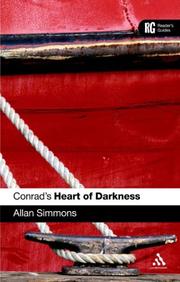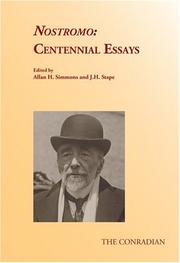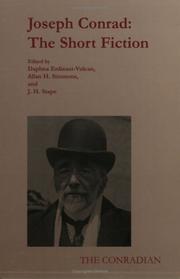| Listing 1 - 10 of 12 | << page >> |
Sort by
|

ISBN: 0826489346 9780826489340 0826489338 9780826489333 Year: 2007 Publisher: London ; New York : Continuum,
Abstract | Keywords | Export | Availability | Bookmark
 Loading...
Loading...Choose an application
- Reference Manager
- EndNote
- RefWorks (Direct export to RefWorks)
Book
ISBN: 9780521887922 Year: 2009 Publisher: Cambridge Cambridge University Press
Abstract | Keywords | Export | Availability | Bookmark
 Loading...
Loading...Choose an application
- Reference Manager
- EndNote
- RefWorks (Direct export to RefWorks)
Conrad, Joseph, --- Conrad, Joseph. --- Criticism and interpretation.
Book
ISBN: 9781107126442 Year: 2016 Publisher: Cambridge : Cambridge University Press,
Abstract | Keywords | Export | Availability | Bookmark
 Loading...
Loading...Choose an application
- Reference Manager
- EndNote
- RefWorks (Direct export to RefWorks)
"An Outcast of the Islands (1896), Conrad's second novel, returns to the Malay world of Almayer's Folly (1895). Focusing on the collapse of Western values and morals in a colonial setting, the novel daringly portrays the power of erotic attraction and exposes the venal ambitions behind small- and large-scale political intrigues. The introduction situates the novel in Conrad's career as a writer and traces its origins and reception. The essay on the text and the apparatus explain the history of the work's composition and publication, and detail the interventions of Conrad's compositors and editors. There are notes explaining literary and historical references, a glossary of nautical terms, illustrations including pictures of early drafts, and appendixes. This edition presents the novel and its preface in forms more authoritative than any so far printed, and restores a text that has circulated in defective forms since its original publication"-- "Conrad's An Outcast of the Islands (1896) returns to the moral world and thematic concerns of his first novel, Almayer's Folly (1895), and to the South-East Asia of his own experience, as he imaginatively revisited the tropics he had left behind him some eight years previously. In committing himself to the novel's writing, Conrad was also taking farewell of his sea-life. The decision to become a professional writer had evolved slowly, in the same way that what was originally to be a short story transformed itself into a full-length novel about moral crisis and its consequences as Conrad discovered that his materials demanded more ample development. While not wishing to pursue the analogy too far, it is perhaps no coincidence that, at the outset of his second novel, the hero's 'little excursion into the wayside quagmires' is intended as no more than 'a short episode--a sentence in brackets so to speak--in the flowing tale of his life: a thing of no moment to be done unwillingly yet neatly and to be quickly forgotten.' Like his central character, Peter Willems, Conrad was to discover that there was to be no going back. He had composed Almayer's Folly, intermittently over a five-year period (1889-94), the manuscript accompanying him from London to various parts of the world--Austrian Poland, the Ukraine, the Congo Free State, Australia and France. By contrast, An Outcast of the Islands took little more than a year to write, from mid-August 1894 to mid-September 1895, and was composed in two places: the writer's London lodgings near Victoria Railway Station, and the Hotel de la Roseraie in the Geneva suburb of Champel-les-Bains, during visits to undergo hydrotherapy treatment for a condition then called 'neurasthenia' (and now termed clinical depression)"--
Europeans --- Trading companies --- Betrayal --- Clerks --- Lingard, Tom (Fictitious character) --- Européens --- Sociétés de commerce --- Trahison (Morale) --- Employés de bureau --- Lingard, Tom (Personnage fictif) --- Fiction --- Romans, nouvelles, etc. --- Southeast Asia --- Asie du Sud-Est --- Fiction.
Book
ISBN: 9781107141407 1107141400 Year: 2017 Publisher: Cambridge : Cambridge University Press,
Abstract | Keywords | Export | Availability | Bookmark
 Loading...
Loading...Choose an application
- Reference Manager
- EndNote
- RefWorks (Direct export to RefWorks)
Charting a homeward-bound voyage from Bombay to London aboard a sailing ship, 'The Nigger of the 'Narcissus'' (1897) captured the late-Victorian era's maritime obsession and identified the strikingly original talent of Joseph Conrad (1857-1924) as a sea writer in what has proved to be a landmark of sea literature. The Introduction situates the novel in Conrad's career and traces its origins and reception. Explanatory notes illuminate literary and historical references, identify real-life places and indicate Conrad's sources and influences. The essay on the text and the apparatus lay out the history of the work's composition and publication, and detail interventions by Conrad's typists, compositors and editors. Also included are notes explaining literary and historical references, a glossary of nautical terms, illustrations, including maps and pictures of early drafts, and appendixes. This edition of 'The Nigger of the 'Narcissus'' presents the novel and its preface in forms more authoritative than any so far printed, and restores a text that has circulated in defective forms since its original publication.
West Indians --- Tuberculosis --- Terminally ill --- Ocean travel --- Blacks --- Patients --- London (England) --- Black persons --- Negroes --- Ethnology --- Black people
Book
ISBN: 9004308997 9789004308992 9789004308978 9004308970 Year: 2016 Publisher: Leiden, Netherlands ; Boston, [Massachusetts] : Brill Rodopi,
Abstract | Keywords | Export | Availability | Bookmark
 Loading...
Loading...Choose an application
- Reference Manager
- EndNote
- RefWorks (Direct export to RefWorks)
When Joseph Conrad’s novel Chance appeared in serial form in the New York Herald in 1912 and in book form in 1914 it established the author’s financial security for the first time. Following years of struggle to reach a wide audience for his fiction, Conrad benefitted from the American marketing of this novel for the women readers of romance. Aggressive advertising promoted the writer’s new focus on a female protagonist and Conrad’s division of the story’s location between land and sea. The novel proved popular and lucrative. Yet in spite of its economic success, Chance remains one of Conrad’s less well-known narratives. This fresh new collection of essays from both young and established scholars opens up a lively critical debate taking Chance beyond the status of best-selling romance. In a striking re-evaluation of the novel these writers examine Chance ’s innovative narrative strategies, its up-to-the-minute commentary on female politics, contemporary ethics, as well as its antecedents in classical debate and the significance of Conrad’s last use of his seaman narrator Marlow.

ISBN: 9789004488830 9789042019140 Year: 2004 Publisher: Leiden; Boston : BRILL
Abstract | Keywords | Export | Availability | Bookmark
 Loading...
Loading...Choose an application
- Reference Manager
- EndNote
- RefWorks (Direct export to RefWorks)
In the century since its publication in 1904, Nostromo has taken its place among Conrad's masterpieces as a panoramic novel of revolution and a profound meditation on history and the effects of "material interests" on human destiny. The eight new essays brought together in this volume examine the novel from various perspectives: as an epic, as a study in colonialism and the problem of "homecoming," as an exploration of free will and determinism, as a textual artefact, and as a reflection upon earlier works of European literature by Coleridge, Pushkin, and others.
Book
ISBN: 9004502424 Year: 2000 Publisher: Amsterdam : BRILL,
Abstract | Keywords | Export | Availability | Bookmark
 Loading...
Loading...Choose an application
- Reference Manager
- EndNote
- RefWorks (Direct export to RefWorks)
"Lord Jim: Centennial Essays" features eight essays by major Conrad scholars to celebrate the centenary of the publication of what is possibly Joseph Conrad's best known novel. This carefully edited volume covers a wide range of topics, and includes new work on the novel's reception and sources, narrative strategies, and thematic interests. Various contemporary critical approaches - Bakhtinian, postcolonial, and historicist - are aired and reconsidered, and a generous selection of documents relating to the Jeddah affair of 1880 sheds light on Conrad's use of real-life materials. The kaleidoscopic perspectives brought to bear on this landmark of literary Modernism will stimulate and challenge both scholars and students alike.
Book
ISBN: 9781107005501 1107005507 Year: 2012 Publisher: Cambridge : Cambridge University Press,
Abstract | Keywords | Export | Availability | Bookmark
 Loading...
Loading...Choose an application
- Reference Manager
- EndNote
- RefWorks (Direct export to RefWorks)
"The five stories brought together in Tales of Unrest (1898) mark a turning point in the writer's career. Conrad's first short story collection evidences a writer firmly in control of his new craft staking a claim to diverse cultural and fictional territories. The introduction situates the writing of these stories in Conrad's career and discusses their sources and contemporary reception. The explanatory notes identify literary and historical references and real-life places, and indicate influences. Two maps and six illustrations enrich the explanatory matter. The essay on the text lays out the history of the work's composition and publication, details interventions by Conrad's typists, compositors and editors, and explains editorial policy. This edition, established through modern textual scholarship, presents Conrad's stories and his preface to the collection in forms more authoritative than any so far printed"--
Adventure stories, English --- Roman d'aventures anglais --- English adventure stories --- English fiction
Book
ISBN: 9781107024427 Year: 2013 Publisher: Cambridge : Cambridge University Press,
Abstract | Keywords | Export | Availability | Bookmark
 Loading...
Loading...Choose an application
- Reference Manager
- EndNote
- RefWorks (Direct export to RefWorks)
Ship captains --- Capitaines de navire --- Fiction --- Romans, nouvelles, etc. --- Conrad, Joseph,

ISBN: 9789004490949 9789042009608 Year: 2004 Publisher: Leiden; Boston : BRILL
Abstract | Keywords | Export | Availability | Bookmark
 Loading...
Loading...Choose an application
- Reference Manager
- EndNote
- RefWorks (Direct export to RefWorks)
Joseph Conrad: The Short Fiction offers a wide range of perspectives on Conrad's short stories. Nine essays, by established and emerging scholars, deal with early and classic stories as well as the relatively neglected works of Conrad's later career. The essays explore in depth the historical and publishing contexts of individual stories and provide insights into Conrad's practice as a writer of short fiction. These new readings, based on contemporary theoretical and interpretive perspectives, will appeal not only to specialists of literary Modernism but also to the advanced student and the general reader.
English News --- Short stories, English --- History and Criticism --- History and criticism
| Listing 1 - 10 of 12 | << page >> |
Sort by
|

 Search
Search Feedback
Feedback About UniCat
About UniCat  Help
Help News
News